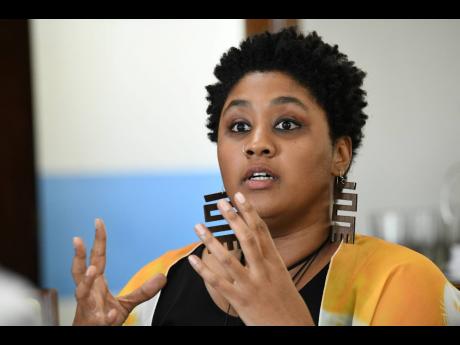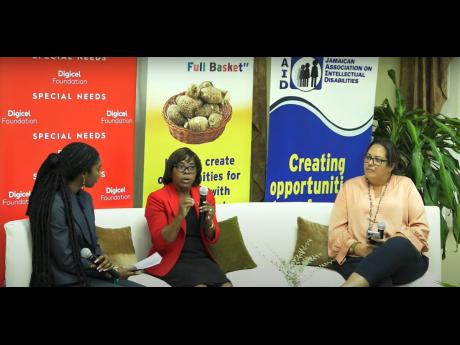Gov’t urged to drive culture shift in perception of people with intellectual disabilities
The Government is being called on to do more to trigger a shift in how society views people with intellectual disabilities (ID).
Carla Moore, an advocate and lecturer at The University of the West Indies’ Institute for Gender and Development Studies, says the Government to assist in the effort by utilising its various communication and social media platforms to share the stories of individuals living with an ID, adding that people with ID who are seen taking charge of the various conversations and expressing their needs should be in such spaces.
“The Government has massive platforms with [a] massive reach, where they are disseminating information. I don’t just want to see information about people with intellectual disabilities ... ,” she said at a recent Jamaican Association on Intellectual Disabilities (JAID) forum.
Moore was one of three panellists at the forum, titled ‘Creating Barrier-free Communities through Leadership, Advocacy and Partnership’, which was the last of activities hosted by the JAID in March, which was observed as Intellectual Disability Awareness Month. The event’s goal was to give self-advocates a platform to discuss their challenges while simultaneously examining solutions to the obstacles that stand in the way of their attempts to engage with various social groups.
According to Moore, many people with IDs have not been given much access to public space because their disabilities have been stigmatised heavily over the years. As a result, there still remain a number of misconceptions about what an ID is, what it looks like and what the people with the disability are capable of, she said.
The term intellectual disability is used to refer to limits to a person’s ability to learn at an expected level and function in daily life.
“We also have to have some culturally specific conversations that the Government could take the lead on around what intellectual disability means. There is still that sentiment that, ‘oh, is obeah cause it’. There is still that sentiment that, ‘oh, is some sin inna di family that cause the person fi have the disability. Is curse the person curse that cause it’,” she said.
Moore further challenged the Government to work with university professors and community leaders whose on-the-ground insight can help to advance a solutions-driven discussion that will increase the ID community’s access to social, professional, and educational opportunities.
“We can’t ignore it, we cannot overlook it because it is uncomfortable to address,” she said.
SENSITISATION ON NON-PHYSICAL ABILITY
Moore said that more sensitisation needed to be placed regarding persons who have a non-physical disability, whereas the provision of wheelchair ramps, for instance, would not be a necessary accommodation.
She also urged the Government to boost efforts to fund initiatives that will work with people from the ID group or secure outside funding for assistance.
“I think we need a truly progressive workplace policy for the employment of persons with intellectual disabilities,” said Moore, adding that such a policy would outline how to make accommodations in the work space and to stipulate duties to execute for the ID community.
She also emphasised the need for community-based groups to be improved in order to facilitate discussions and increase the effectiveness of different sectors, including the police force and other public-sector bodies.
Saffrey Brown, project director for Project STAR – a social and economic development initiative created by the Private Sector Organisation of Jamaica in partnership with the Jamaica Constabulary Force – asserted that the majority of the companies in Jamaica are civic-minded and strive to be good corporate citizens.
As a result, she advised the JAID that “now is a good time to push forth” in carrying out targeted approaches to work with various private sector groups for a truly inclusive society.
“What we need to make sure is that within these companies ... are advocates who are communicating and sharing what is happening, sort of advocating for what kind of enabling environment is needed,” she said.
Brown stated that the inconsistency in execution was caused by a lack of knowledge and focus on fostering greater integration of people with IDs in the workforce.
She noted that training is crucial, emphasising that it should be an ongoing process so as to promote kindness, understanding, conflict resolution, and a readiness to accept an environment in which everyone is valued, treated with respect, and seen as essential to the organisation.
The long-term goal of the JAID is to offer dynamic leadership, advocacy, and influence that will promote full inclusion and integration of people with intellectual disabilities and other developmental disabilities in society.
Dr Joan Reid, president of the council of management for the JAID, said that as one of the barriers for persons with ID was language and communication, there are some individuals with an ID that will need a voice to lobby for them to get better care, to gain employment, and to have a special needs area immersed into the education system where they will be properly facilitated.
“That is why every teachers’ college must teach at least teach three modules in special education, of which intellectual disabilities is a part, so that every teacher ... [is] exposed to what disabilities issues are,” she added.
Moore, who also spoke about empowering the youth to advocate for themselves, encouraged them to assert their right to a full life of experiences, express their preferences, insist that others pay attention to them, and demonstrate their capacity for independent thought.
“A lot of the times, people from marginalised groups, we treat them like beggars, so when they decide that they are going to ask for exactly what they need, there is a part of us that bristles against it because ‘how dare you ask for so much!’, [but] no, the days of living on the crumbs of society are done,” she said.


